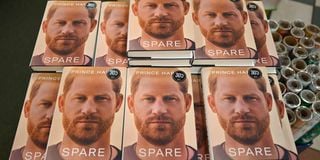Premium
Palace intrigues in Prince Harry’s explosive memoirs

Copies of ‘Spare’ by Britain’s Prince Harry, Duke of Sussex, are displayed at a Barnes & Noble bookstore on January 10, 2023, in New York City.
“In August of 1929, Sigmund Freud scoffed at the notion that he would do anything as crass as write an autobiography. ‘That is … an impossible suggestion,’ he wrote to his nephew … Unseemly self-exposures, unpalatable betrayals … memoir, for much of its modern history, has been the black sheep of the literary family. Like a drunken guest at a wedding, it is constantly mortifying its soberer relatives (philosophy, history, literary fiction)—spilling family secrets, embarrassing … family, friends and enemies, most of them still alive…” so once wrote Daniel Mendelsohn in The New Yorker.
I thought of this as Prince Harry, the Duke of Sussex, released his explosive memoirs (Spare) on Tuesday, January 10, 2023. It’s a Shakespearean drama of palace intrigues, sibling rivalry, pain, heartbreak and loss.
His autobiography feeds our obsession with royalty—maybe we all long for that place on a pedestal—that loftier region of utopia out of reach for many ‘commoners’. Prince Harry has dished out family secrets—reportedly to the great consternation of the British royal family.
The title of the memoirs is from the British phrase, “an heir and a spare” and it refers to two children of a monarch; “one to succeed to a title and the other to guarantee the family line should anything happen to the first”. The assumption is that his older brother William, Prince of Wales, is the heir and Prince Harry is the spare—setting up the centuries-old, inevitable, bitter rivalry between royal siblings.
Controversial figure
Prince Harry is a controversial figure. In TV interviews, sometimes he is teary—eyes bloodshot, giving him a wounded, fugitive and startled look. If the British royal family were an album, Prince Harry would be the grimiest and most jagged song—the black sheep of the family.
In his memoirs, he has opened up in many intimate ways. He fondly remembers his mother when he writes: “The thought of her, as always, gave me a jolt of hope, and a burst of energy. And a stab of sorrow. I missed my mother every day, but that day, on the verge of that nerve-racking rendezvous …I found myself longing for her, and I couldn’t say just why”.
Prince Harry shocked the world when he and his wife Meghan (Duchess of Sussex) left Buckingham Palace and also stepped down from their senior royal duties. Why had Prince Harry seemingly tossed his privilege out with the carelessness of a whim?
It seemed unbelievable that he had become uninterested in being a royal or thrown away the ambitions of being king, like a plant watered for years that is abruptly allowed to die of drought—all royal dreams somehow numbed, blunted.
The very idea of leaving home (Britain) to reinvent himself in another country (America) and give himself an identity radically different is fascinating. Writer and poet Robert Louis Stevenson would have said: “Sing me a song of a lad that is gone…Merry of soul he sailed on a day/Over the sea...”
Critics will have much to say about Prince Harry’s memoirs, from his confession of using cocaine to giving the number of enemy soldiers he killed in combat.
Family dysfunctions
As with all memoirs, some of the accounts will be refuted. However, we should give Prince Harry (and whoever the ghostwriter was) credit for producing an autobiography that, in the words of the Italian novelist Elena Ferrante (originally used elsewhere but can apply here), makes us “look through every line, to gaze downward and feel the vertigo of the depths, the blackness of inferno”. He shows us how to face our own family dysfunctions.
There is something that Prince Harry’s autobiography has already achieved: showing us that even members of the royal family are humans like the rest of us.
This is important because members of royal families, from time immemorial, were put in a special category; in the realm of myth and fairy tales. Prince Harry touches nostalgically on this when he writes (about Buckingham Palace): “How beautiful it all is, I thought. And also how sad. Once upon a time, this was going to be my home forever. Instead it had proved to be just another brief stop”. That “Once upon a time…” conjures up the typical English fairy tale and its association with royalty and “living happily ever after”. For Prince Harry, his life has been like a fractured fairy tale; a far cry from “the happily ever after”.
Writing in The Guardian, Charlotte Higgins contends that royalty has always been special: “The monarchy relies on fiction. It is a constructed reality... that a human is more than a human… The monarchy is theatre, the monarchy is storytelling, the monarchy is illusion…All this explains why royals are so irresistible to writers of fiction…they are already halfway to myth”.
Human side of royals
Prince Harry has cracked this myth and let us see the human side of royals through his memoirs—they also have black shadows that can bring back childish fears and the prospect of ruin.
Though Prince Harry is now a prince without a kingdom, he is a prince conjuring up new kingdoms through narratives. He has finally found a melody that fits, a song he can sing: telling stories. Maybe that is his kingdom. And with his memoirs, he makes his first major, enduring literary contribution.





